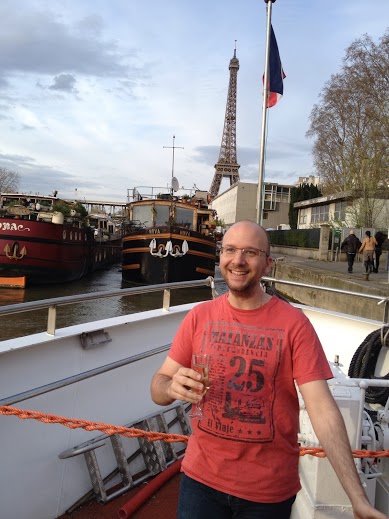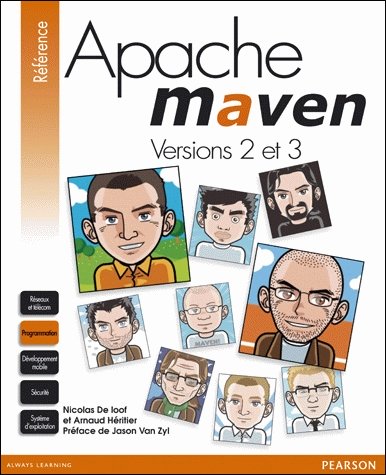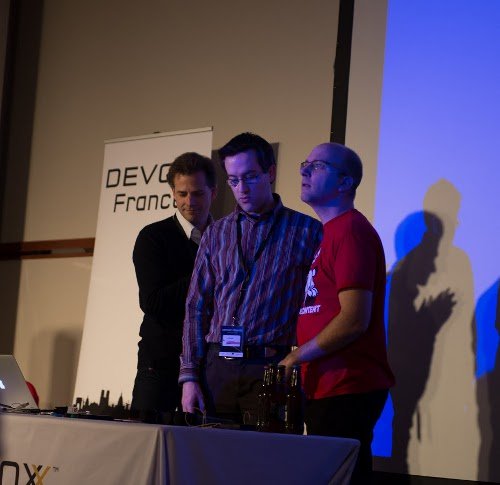Interview: Our Own Arnaud Héritier at the Devoxx France 2014 Committee for Papers Selection (Part 1/2)
A big thanks to Thierry Leriche-Dessirier who carried out this interview for Developpez.com and authorized us to translate it into English. You can find Thierry on Developpez.com or follow him on Twitter at @thierryleriche.
The original article in French is here, Thierry’s blog is here, and his other articles on Developpez.com are here.
The original interview has been cut into 2 posts:
- This first post is about Arnaud and his work as a Devops.
- It will be followed by a second one about Deveoxx France and Arnaud’s involvement in the selection committee
Devoxx France 2014 Java conference will be held soon in Paris. The committee for presentations selection is hard at work to prepare the program. Many proposals, all of great quality, are still being submitted every day.
Arnaud Héritier, already known for his participation in the “Cast Codeurs”, in various JUG as a speaker or member of the organization, as an author, as a confirmed expert in the Java and Devops fields, also participates in the operation of the CFP (Call for Papers).
He readily agreed to answer a few questions about his career, Devoxx and his selection work for the event. He gives us some tips to make papers more attractive and more in line with this year’s themes.
I. Introduction
We already had the pleasure to interview Arnaud Héritier and Nicolas de Loof when they published the Maven book they both co-authored in 2009 (read the interview here). Today, we’ll focus our interest on Arnaud for his involvement in the team that selects conferences for Devoxx France 2014. Proposals submitted to the CFP site (Call For Paper) are not all accepted, far from it… Arnaud explains to us why.
In this interview, Arnaud discusses his background and his work as a Devops expert. He talks about Java, its ecosystem and the competition that gets organized around JavaScript particularly. He also presents his vision of the Java community and the future.
II. Introducing Arnaud
Arnaud, can you introduce yourself in a few words? What is your background?
I just turned thirty-seven years old, I have three children and a wonderful wife (it goes without saying). Soon it will be 15 years I have been working in IT. I fell into the computer thing rather young, impressed by the movements of a turtle, represented by a triangle, on TO7 screens. I played a lot on an Atari 1040 STe but I particularly discovered the world of demo-makers who were making every effort to operate a 320×200 resolution, 16-colors, graphic card. I actually started to “code” bits of demos in assembly or turbo pascal on my first PC: a 486.
After that I studied computer by going to university (Paris 6), where I obtained a masters in systems and networks and a graduate diploma in software applications engineering.
I am naturally into everything computer related. I enjoyed studying the lower layers of systems and networks as much as the upper layers (application).
My career is much the same. I’ve enjoyed a variety of positions and business types, working for software vendors, consulting firms and IT companies of different sizes.
Since 2009 I’ve worked for eXo, which develops an open source social collaborative platform and since 2003 has been committed to creating and promoting open standards for the Web and Java. We sell our product historically on-premises and recently as a SaaS.
On which technologies are you working?
When I need to develop applications, I often turn to Java, which I’ve known for over ten years. Sometimes I also code with Groovy Grails or Play Framework.
If I want to go fast without looking at tomorrow, I might fall back on the good old PHP (not that we cannot make anything sustainable in PHP, but personally this is outside my comfort zone). With my OPs hat (sysadmin) I mostly use Bash, Ruby and configuration management tools such as Puppet.
When we type your name on Google, there are many references to Maven. Why is that?
It’s an old love story between Apache Maven and I. It started in the years 2001/2002 where, after a few similar projects (small web applications to be deployed in a Tomcat), for an IT company I started to get tired managing X copies of Ant scripts and N duplicate libraries of any versions in CVS.
I then discovered Maven 1, a kind of Ant++ that allowed me to standardize my builds, my documentation and to share my recurring treatments in plugins and my libraries in warehouses. Another added value, by default it proposed a lot of good small and friendly reports on the quality of projects. From user, I became contributor and after harassing the team of developers with patches on the PDF documentation generation plugin, I became committer (thank you Emmanuel Venisse). Some time later, I joined the Project Management Committee (PMC), which gave me a greater responsibility for the project.
I tried to contribute as much as possible to the project, but not necessarily only in the form of code, but also as an evangelist (I presented Maven again and again in conferences or JUG). I also co-authored a book on Maven in French, written with Nicolas De Loof.
What is your typical work day like?
Since I joined eXo, I work 95% of my time from home. The remaining 5%, I travel to see our teams around the world (Vietnam, Tunisia and Ukraine in the past).
Telecommuting gives me great flexibility. While a typical work day is 9am to 6pm, I have time to take the kids to school and pick them up. Unlike my previous commuter life, where I hardly saw my children during the week, I can now enjoy them while keeping “normal” schedules.
I can easily shift my schedule on occasions to manage my children activities, their medical appointments or take care of them and give my wife a break.
Since many of my colleagues are in Asia, I make sure to make myself available in the morning to give them my support and I take the afternoon to work quietly on internal projects.
What is being “Devops”? What makes you like it?
Our companies are often broken up into tons of services, sectors, and silos, which equally create slowdowns in providing the real service to the end-user. Being a Devops is above all about listening to others, and helping them solve their problems throughout the whole chain of production (from writing the code to its deployment in production).
For some years we saw these organizations being challenged. The agile movement wanted to streamline the relationship between the product owner, customer representative, and the development team. The lean methodology has highlighted the interests of working on production workflows and the Devops are trying to break down the walls between the developers, the QA (Quality Assurance) and OPs. We must work hand in hand and therefore understand what each expects so we can adapt processes and tools to streamline the whole supply chain.
This is what I do at eXo working with our Dev / QA / OPs teams, trying to provide the best tools and working methods and processes to improve the quality of our deliverables and the productivity of our teams.
We often meet you in JUG / conferences as a spectator,as a speaker or member of staff…
Yes, I’m a big talker and I love sharing what I know. So whenever I have the opportunity, I come and talk at various events (conferences, JUG, etc..). It is also a workaround to the main downside of telecommuting: isolation.
Also when the Devoxx team contacted me three years ago to offer that I be part of the Devoxx France adventure I accepted without hesitation. This is a totally different and more rewarding experience than what I could do before.
We can also follow you in audio … This is another adventure …
Yes, for several years I have spoken regularly on the “Les Cast Codeurs” podcast, which discusses the Java ecosystem in particular and IT in general. We co-animate with Emmanuel Bernard, Guillaume Laforge, Antonio Goncalves and Vincent Massol. Each episode is listened to by thousands of francophone listeners.
This activity is interesting because it forces us to be up to date with the news. Moreover animation through a microphone is not always obvious (remember slides and gestures make you understandable).
What are the future technologies and upcoming topics that interest you in the Java environment?
What interests me in Java is first and foremost the JVM and its ecosystem. Having such a platform is unprecedented. We have built over the many libraries and we see today emerging a plethora of languages that all open many possibilities to deal with different IT problems.
Today the issue is not, in my view, to say which language is better than the other, or what web framework is more “trendy”. Everything is there at your fingertips and the ecosystem of tomorrow will be even richer than today. What you need to know to do today is to choose. Choosing the right language, the right library for the good use case and work for the interoperability over the JVM to be sustainable.
Do you have any passions outside of IT?
Yes – at least I try to keep a few. Even if it is not seen, I like sports, especially mountain biking that I can devote myself to during lunch breaks.
Since childhood, I’ve practised model railroading with my dad and now with my children. We have at my parents’ house a small track that we enjoy looking after and operating.
What do you think of francophone communities, including Developpez.com. What are their strengths, gaps?
The Francophone community is generally very active in IT. It can be seen through its significant involvement in open source projects, but also in forums, blogs and other resources available in French on the web.
The well-known French problem is to be angry with the English and to not always make the effort to get started. When I started in IT, like many, I looked for answers in these Francophone resources.
I have myself contributed by publishing a book in French on Maven, by recording the Cast Codeurs, going to French JUG or preparing DevoxxFR in which 75% of the sessions are in French.
On the other hand, on writing supports, I quickly limited my presence on French forums and even on my blog, I now try to write it in English. The reason is mainly the lack of time, because it is difficult to quickly spend time on forums in French when we are already struggling to find time to answer the users of the English projects (with a much greater visibility).
I think it is important to maintain the francophone community as Developpez.com can do, but it is imperative that developers make the effort to speak English well and be in contact with English-speaking communities that generally centralize the IT resources.
Do you think we should continue to invest in Java? When we see that JavaScript is gaining such momentum…
JavaScript runs on the JVM, so it’s no problem for me 🙂 I am impressed by the evolution of JavaScript over the past decade. I still remember my early days when our customers forbade us to use JavaScript in web applications for security reasons. Today it is just unthinkable to have a web GUI without a single line of JavaScript.
JavaScript is here and it is here to stay even if it begins to have its challengers like DART and Co. This is an especially huge ecosystem that has developed and now allows important code to be maintained without much risk.
JavaScript is far from being perfect though, the language especially. (I always laugh so much watching WAT presentation Gary Bernhardt.)
So yeah JavaScript and Java still have a long life ahead of them and I think that today’s developer must be able to adapt to tons of languages and environments that they will have to master during their career. We must never rest on our laurels and must continually learn to stay on top (and stay employable with high added value …).
We again thank Thierry Leriche-Dessirierand Developpez.com who carried out this interview and authorized us to translate it into English.
You can find Thierry on Developpez.com or follow him on Twitter at @thierryleriche.
The original article in French here, Thierry’s blog here, and his other articles on Developpez.com here.
We hope to see you at Devoxx France 2014 and in the mean time, you can discuss with us on our community website.



